Calling a game "enhanced" justifiably raises expectations. You go into it looking for something extra, an improvement over the original plain-Jane version that you can see and feel. With that in mind, it is hard to view Overhaul Games' Baldur's Gate: Enhanced Edition as anything but a disappointment. Yes, this revamped and pumped-up take on the 1998 Dungeons & Dragons classic from BioWare is just as compelling and hard to put down as the 14-year-old forebear that became a gold standard for role-playing games. But it doesn't add anything of real value to the experience aside from interface and graphical tweaks long available to the original game through free mods, along with largely forgettable new content in a trio of potential party members and an arena combat mode. And to make matters worse, the game arrived loaded with bugs and remains shaky even after a few patches.
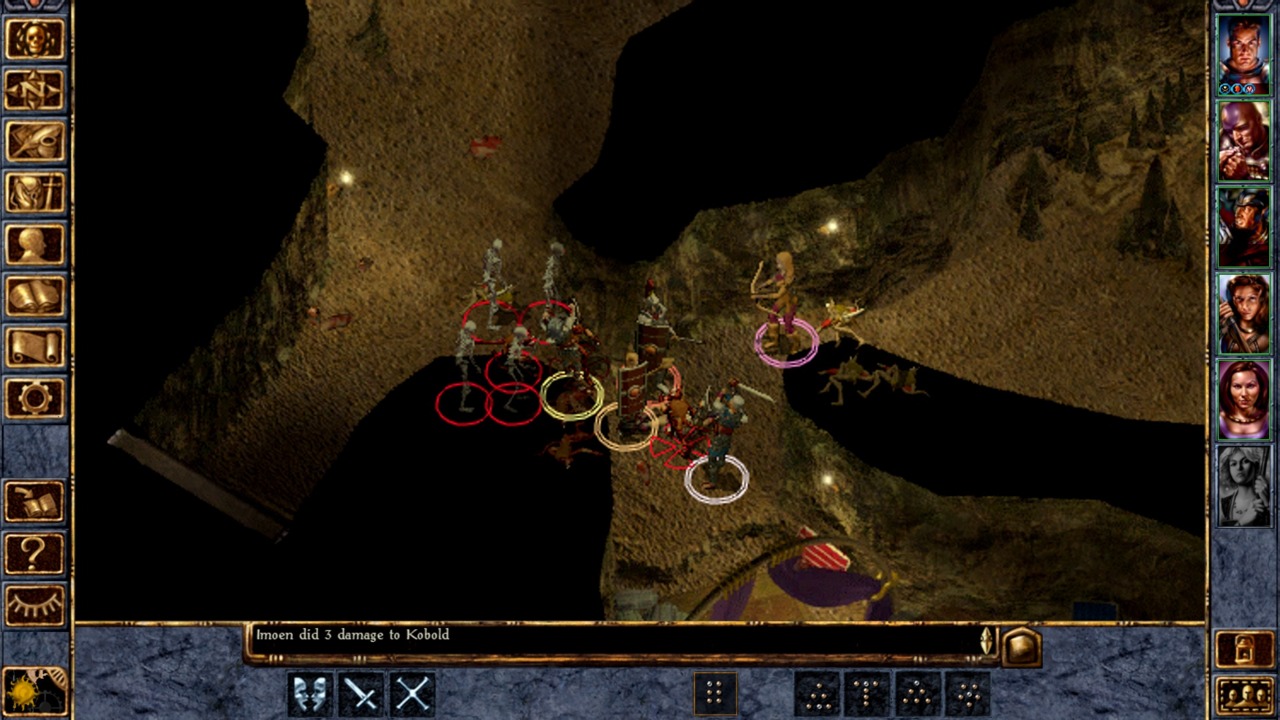
Fortunately, the core game (along with the 1999 expansion pack Tales of the Sword Coast, also rolled into the mix here) remains strong after more than a decade, and is a deep, incredibly engrossing role-playing game. The plot driving the swords-and-sorcery derring-do is far from gripping, the game instead focusing on your relationships with party members--a diverse and relatable group of individuals with different personalities and motives. Alignment is a vital concern: mix good and evil in the party for long and adventurers eventually come to blows. You can even face defections if your actions aren't somewhat in line with party members' philosophies.
You have to have real affection for the arcane rule system of D&D to appreciate how much this game offered to Gygax enthusiasts back in the late '90s--or to even appreciate it now, because the Enhanced Edition sticks with the labyrinthine second-edition Advanced D&D rule set from the late '80s that powered the original game, rather than the totally overhauled rules that have been around in third and fourth iterations since 2000. If you have no experience with D&D, you may have some reading in store. Even if you have some familiarity with the modern versions of the great-granddaddy of RPGs, you need to understand how the game was played over a decade ago to get the most out of the complex mechanics.
Even with rules likely to confuse a newcomer, the manner in which Baldur's Gate combines its numerous elements in such an uncompromising way can brew up serious ambrosia. This blend of largely open-world role-playing with strategic, pausable real-time combat conducted by a party of up to six disparate adventurers can make for an incredible experience. Both the role-playing and strategic depth are tremendous, forcing you to manage your party and think seriously about spellcasting and swordplay when delving into battles.
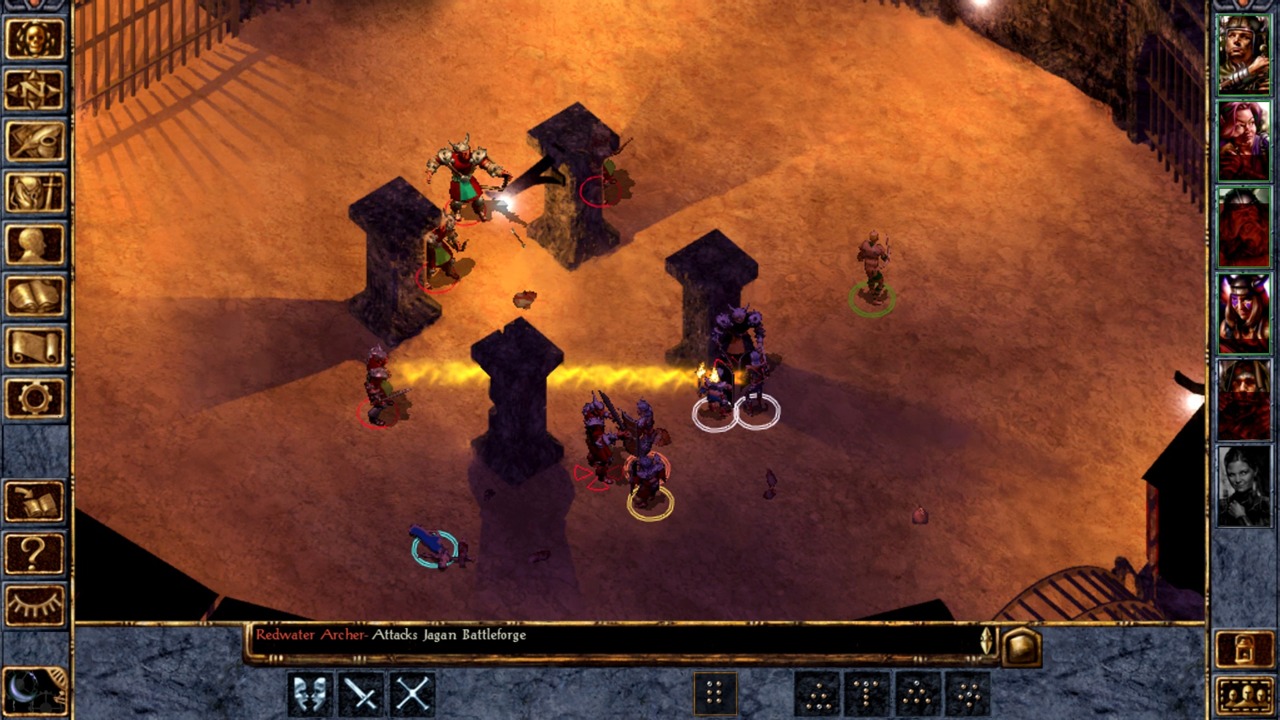
The Enhanced Edition brings back these great features, and even expands upon them by tossing in extras that were not incorporated into the series until Baldur's Gate II: Shadows of Amn. With or without these add-ons, the game hits a sweet spot between role-playing adventure and tactical squad-based combat. Parties must be properly structured to take advantage of different character classes. Concocting a good mix of warriors, mages, and specialists like thieves, rangers, or even bards is vital to simply surviving against some of the opposition. You can't throw your party into the fray without serious contemplation and preparation, especially after you hit the midway point and encounter enemies who will shred you with magic if you don't have ways to counter their incantations. A wide range of available adventurers provides nearly unlimited choices when it comes to party composition.
Despite such deserving praise, there isn't much in the Enhanced Edition to merit such a high-reaching subtitle. Most of the improvements have long been available free of charge online with the fantastic BG1Tutu and a host of other mods that add an incredible number of features to the original game. There are few benefits to paying $20 for this version of the game as opposed to shelling out $5 or $10 for the original game and then taking a half-hour or so to download and install the mods. For some, the Enhanced Edition might be a preferable one-stop shopping option, but there are serious drawbacks with this approach.
For starters, this is not a completely fixed-up game. Overhaul did not address some old, glaring problems. Though some of the original's issues have been tightened, many flaws have been left depressingly intact. Pathfinding with party members, for instance, is as messed up as it ever was. Characters still routinely run into one another and wander away into the scenery. Even something like a copse of trees can turn an orderly march into a scramble through the woods where your weak mage winds up being the first guy to run into a gang of hobgoblins.
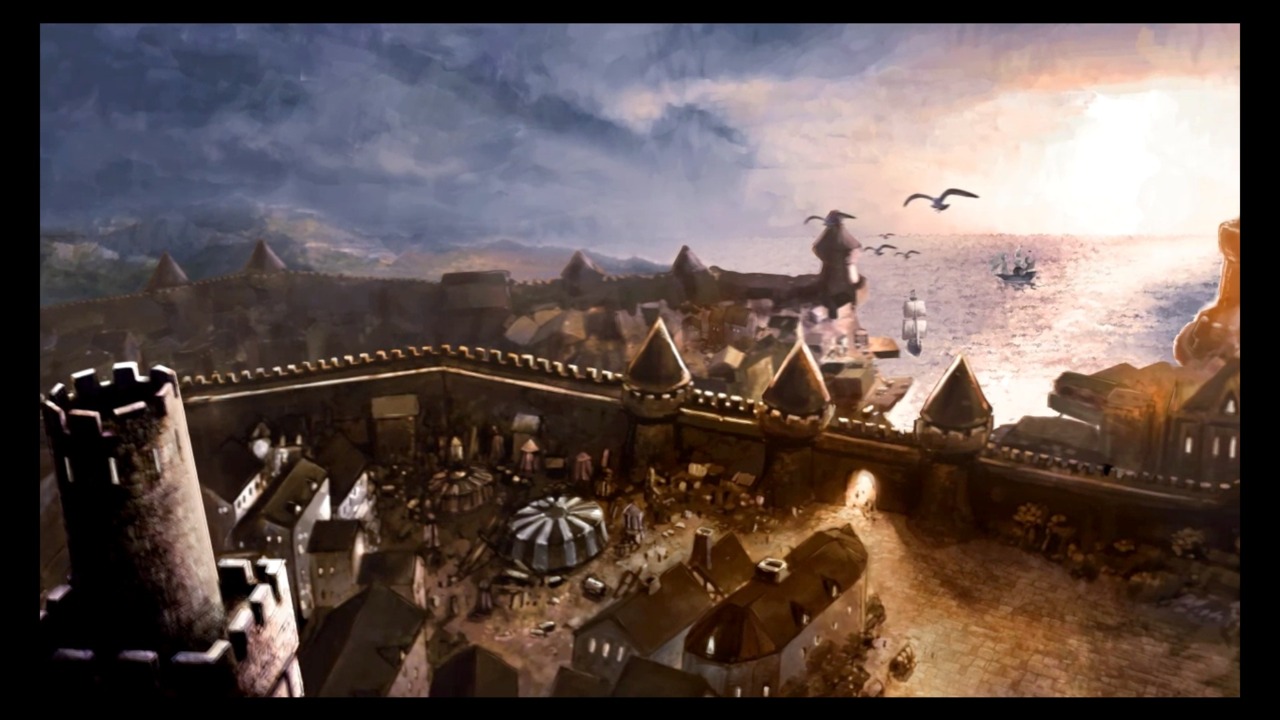
Indoors, things are worse. Corridors and chambers are too cramped for characters to turn around without roaming off on their own. You can walk into a room and find some of your party unable to move, which is a real problem if the frozen guys are your heavy-armored brawlers. Characters also mill around when leaving a screen, with the whole party still needing to be on the edge before you can travel to another area. Hearing that familiar "You must gather your party before venturing forth" triggers nostalgia, but it's also a reminder that things weren't always so great in the good old days. It's disappointing that these essential functions have not been smoothed out.
The new content does not do much to improve the overall character of the game. The main saga has been bolstered with three new characters that draw on character classes and skills not available in the original Baldur's Gate. But while the half-orc Blackguard Dorn isn't a bad addition, because of his two-handed magic sword and ability to level up quickly into a melee powerhouse, both the wild mage Neera and the monk Rasaad are tougher to appreciate. Neera is wild, which can dramatically affect her spells to the point where you never know what she's going to cast. This is true to the class, but it also makes her a much less attractive option than a dependable mage like Dynaheir.
Rasaad is a more tempting addition to your party, although monks are so weak in their starting levels that it is difficult to keep him alive without burying him in your party formation for many hours. The trio at least comes with quests that flavor the game, which are decent additions, particularly Dorn's quest for revenge. Still, you won't miss anything memorable if you skip them, and some of the new art assets are terrible. The area added for Neera's quest to become a better wild mage, for example, features water that looks like old-fashioned television static.
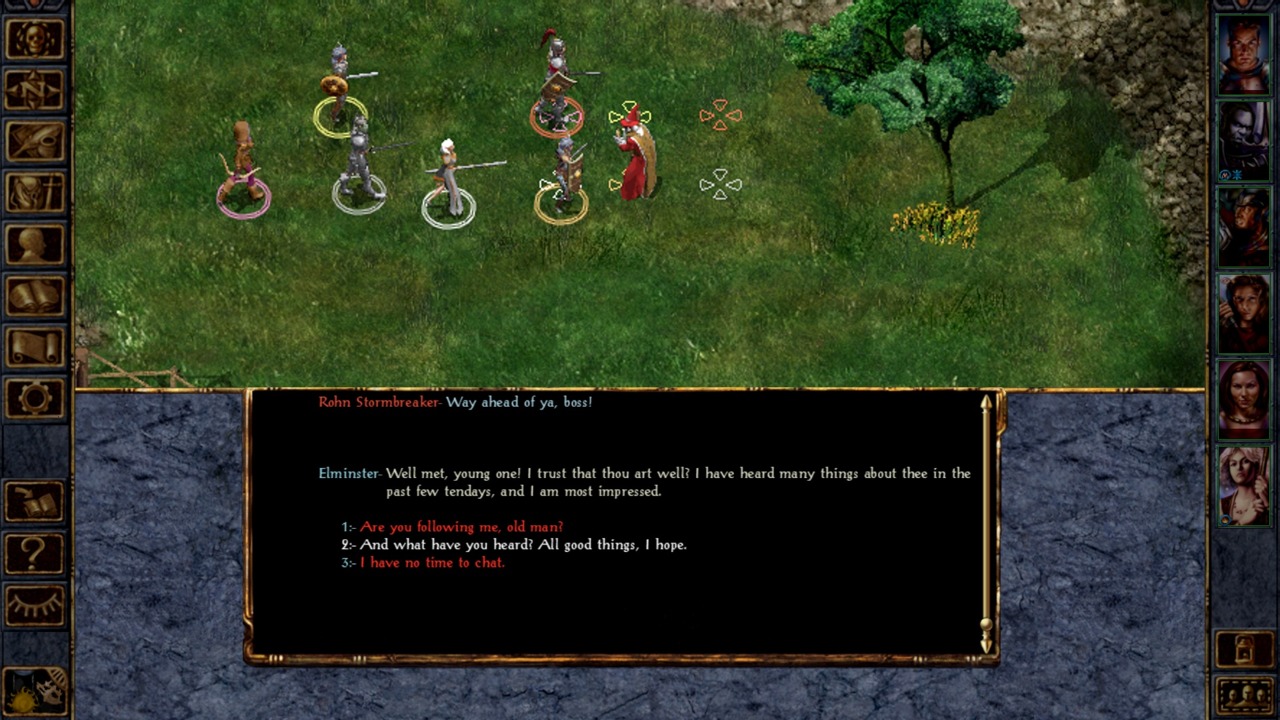
Another totally new feature is the Black Pits, a gladiatorial arena run by a sadistic charmer of a drow named Baeleoth who seems to be channeling Killian from The Running Man. This mode stands apart from the story-based campaign and is launched separately from the main menu screen. It is an interesting way to try out battle tactics and play with items and spells that might not be available in the main game for many hours, or maybe even at all, but in the end it turns into a battle grind loaded with repetition. There's no great context for this mode: You select characters from a pre-rolled list and have at it. Baeleoth and his sidekick djinn are nifty antagonists with some good dialogue, and the market for gear is staffed by a colorful collection of weirdos, including a myconid and a mind flayer. But that's about it for story and setting.
The arena's one plus is how fast the action moves moves. Battles fly by, even when you're taking on large numbers of foes and powerful mages, and you level up very quickly. So even if everything seems monotonous, the action speeds along fast enough to hook you for a good few hours of trying to win the competition.
The original's visuals have been improved to support high resolutions that give you a more panoramic view of the still-attractive 2D backgrounds, most notably the autumn-tinged leaves of the forests that cover the Sword Coast. You can now zoom in on the map with the mousewheel, but those old sprites and character models lack detail at the default viewing scale and turn into fuzzy messes if you look too closely. Zooming in is suitable only in the midst of tough combat where you absolutely need to see who's laying a warhammer on whom. Otherwise, it's best to leave that mousewheel alone.
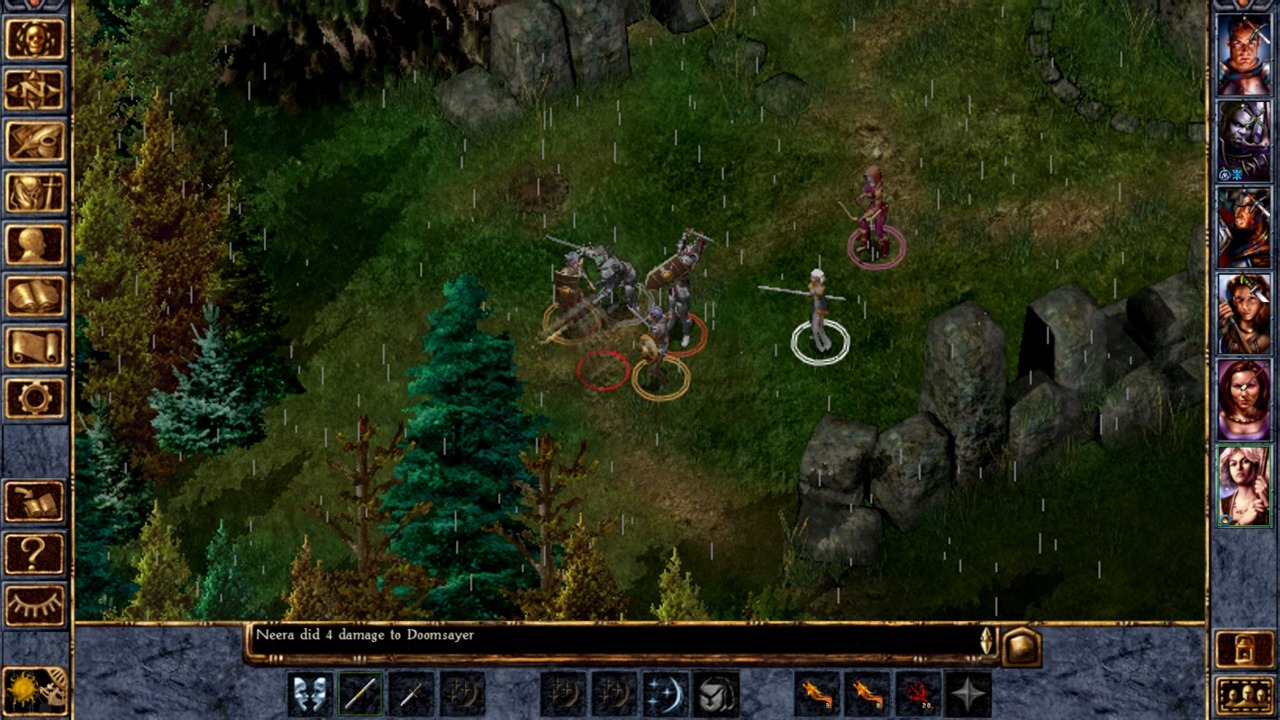
There are other graphical problems. Cinematics have all been redone, but in a rough graphic-novel style that is almost as dated as the videos that they replace. Much of the text has been roughly blown up to a higher resolution, so it often looks blurry. Rain and spell effects can combine to cause slowdown, and flickering is an occasional issue. Some new character portraits are available, although all are done in a different, grungier art style than those in the original game. The user interface is also disappointing. While it comes with some welcome adjustments to inventory management like an increase in the number of arrows that can be held in a quiver and gem bags and scroll cases to make it easier to store ill-gotten gains, the UI is as big and clunky as that in the original game. You can't even access significant graphical options within the game to adjust settings like resolution.
The audio has weathered the years better than the video. The haunting musical score returns intact and has been bolstered by some new tunes that fit in well with the old ones. If you haven't played the original for a while, chances are good that you won't be able to tell where the old stops and the new begins. Weapon and spell sound effects carry weight, too, although death still comes with such a quiet whimper that you can sometimes reach the end of battles and quick-save before realizing that someone was sent to an early dirt nap. There is also no audio notification of big character changes, like a paladin doing one too many evil deeds and falling to the status of a regular fighter (which is irreversible here).
Character voices remain as distinctive and loaded with individuality as always. The new voice samples for the three new characters fit in pretty well for the most part. Not one is as irritating as some of the cast from the original game. There is a fair amount of repetition, however, so lines like Neera's combat rant about baddies getting ready for a "frosty--or maybe flaming--death!" go from cute to maddening after hearing them a couple of thousand times. Most of the new romance dialogue is horrific, although the worst lines--your responses, which include banter like "Give me some sugar, baby"--go thankfully unvoiced. There are also some new character voice sets for the protagonist, although not enough to offer much in the way of real choice.

Performance is another issue. Stability problems are gradually clearing as patches are released, but issues are still widespread. Initial problems getting the game to run at all have been mostly addressed, but other bugs linger. One of the more irritating glitches involves former party members wigging out after being dropped from the gang and constantly asking to be let back in until you finally make it off the map and escape them in a new location. Conversations with new characters are also off-kilter. Get tight with someone like Dorn or Neera, for instance, and you regularly trigger the exact same chats over and over again, sometimes three or four or five times in a row, which halts the game because you can't ignore them.
Being negative about anything relating to Baldur's Gate is tough given lingering fond memories and how good the original game remains. Still, you can't view this remake in a fully positive light. Additions and enhancements are of questionable merit and are already largely available with very comprehensive, very stable mod packages for the original game, and major bugs have caused a lot of frustration. Even though replaying Baldur's Gate is a worthwhile trip down memory lane for anyone who appreciates a deep RPG, the lack of notable improvements and new features throws more than a few roadblocks in your way.